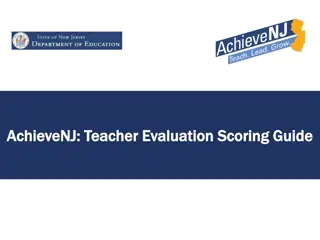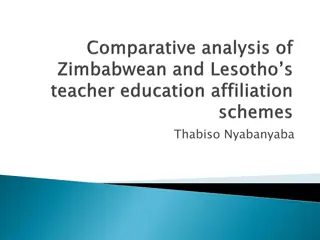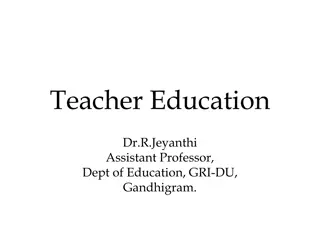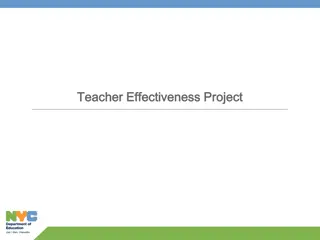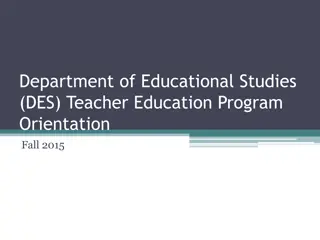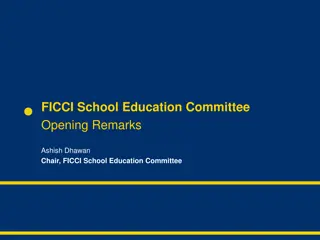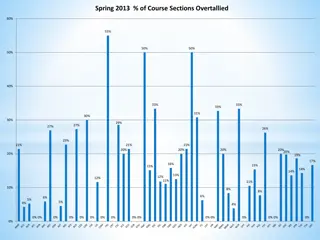
Challenges in South African Teacher Education
Explore the challenges facing teacher education in South Africa highlighted at the International Policy Dialogue Forum. Issues include lack of access to quality training, mismatched demand for teachers, and ineffective funding mechanisms, emphasizing the crucial role teachers play in educational development.
Download Presentation

Please find below an Image/Link to download the presentation.
The content on the website is provided AS IS for your information and personal use only. It may not be sold, licensed, or shared on other websites without obtaining consent from the author. If you encounter any issues during the download, it is possible that the publisher has removed the file from their server.
You are allowed to download the files provided on this website for personal or commercial use, subject to the condition that they are used lawfully. All files are the property of their respective owners.
The content on the website is provided AS IS for your information and personal use only. It may not be sold, licensed, or shared on other websites without obtaining consent from the author.
E N D
Presentation Transcript
International Task Force on Teachers for Education for All 6TH INTERNATIONAL POLICY DIALOGUE FORUM Kinshasa, DRC 27th-28th November 2013 Sub Themes: Teacher education - structures, contents and outcome
Presentation Title: South African Democratic Teachers Union (SADTU), Driving Continued Teacher Professional Development from within Presented by: Mr. Lesley Abrahams labrhams@jet.org.za Date: 27 November 2013
The South African Context The Teacher Summit of 2009, and the resultant Integrated Strategic Planning Framework for Teacher Education and Development in SA, 2011 2025, (ISPFTED) highlighted the following challenges which cut across Teacher Education and Development in the country. A lack of access to quality Teacher Education Development opportunities for prospective and practising teachers; A mismatch between the provision and demand for teachers of particular types; The failure of the system to achieve dramatic improvement in the quality of learning and teaching in schools; A fragmented and uncoordinated approach to Teacher Education Development; The tenuous involvement of teachers, their organisations and other role players; Inefficient and poorly monitored funding mechanisms. The ISPFTED recognizes that the ultimate responsibility for recruiting, preparing, inducting, developing and utilizing human resources in public education lies with government, and views teachers as essential contributors to the structure and implementation of teacher development programmes The ISPFTED adopts a 15 year time-frame but recognizes the need for immediate, medium-term and long- term deliverables to ensure quality teacher education and development. For the first five years of the ISPFTED (2011/12 2015/16) the following categories of educators were identified: School Leaders (principals, deputy principals and heads of department) and Subject Advisors; Practising teachers, Mentor teachers, Un- and under-qualified practicing teachers, Special Needs teachers
The Challenges Educator qualifications having increased dramatically in the last 29 years from a base of 53% of educators that were appropriately qualified in 1990 to 94.4% in 2008 Carnoy et al observed that teachers who did better in a mathematics test also, on average, taught mathematics more effectively and taught more lessons He recommends that learner performance could be increased by more teacher training in mathematics and pedagogical mathematics knowledge as well as how to teach the required national curriculum Short term teacher training sessions have no long term effect on teacher knowledge or learner performance If 100 days of training of maths and science teachers, respectively, in Limpopo could only improve the teachers average scores in teacher tests from 39% to 59% in maths and 31% to 39% in Chemistry, what could a one or two day training sessions hope to achieve? Classroom practice needs to be improved significantly as majority of the teachers cover less than half the curriculum, give less than expected exercises and mostly write less complex exercises.
The status of classroom practice indicates two realities: There are deep-rooted traditions and practices that have to be reversed among the majority of the teachers; and Tangible and sustainable changes in teacher performance will not be achieved through light-touch programmes, but require more carefully planned, demonstration based, deep and sustained support interventions. An increasing number of improvement interventions suggest that in-class/ in-school mentorships and support will provide better results than lecture room style development activities. Large scale mentorship intervention projects, possibly supported by ICT based platforms may be an effective technical solution to these challenges.
Our Response: The Philosophy of the SADTU Curtis Nkondo Professional Development SADTU wishes to demonstrate leadership in teacher development. This commitment will be expressed in concrete projects led by SADTU in partnership with universities, educational NGOs and education departments, and in collaboration with other teacher unions. Teachers need to - Drive their own professional development, supported by networks which can assist them to identify and promote best practice in teaching and learning; Teachers through collaborative enquiry, identify pedagogical practices that help students learn;` Teachers develop confidence in analysing evidence of learning (and difficulties in learning) in their students work as a basis for reflecting on improving teaching; Teachers hold each other accountable for adhering to best practice and the ongoing quest for continuing personal professional development; Teachers are motivated to improve their practice by increased success in the learning of their pupils and by sustained collegial support;
SADTUs Response Continued In 2010, the SADTU National Congress resolved to establish the SADTU Curtis Nkondo Professional Development Institute (SCNPDI) The main objective of the Institute is to use the facilitation and education skills of SADTU to provide professional development training to SADTU members and other teachers . The Institute seeks to identify and develop lead teachers among the SADTU membership who will play an active role of training and mentoring other teachers and set up systems and networks that will allow the teachers to organize themselves into professional learning communities. In an effort to concretize the vision of the implementation of a Professional Development model owned and implemented by teachers, SADTU has entered into an agreement with JET Education Services (Education NGO) to assist with the establishment of its Professional Development Institute.
Critical assumptions underpinning the change theory Authority to implement the changes Incentives to change Ideas and facts to drive the intervention Expertise to drive the intervention (how the various pools of expertise collaborate and Integration- of the different players) Understanding among the teachers and education officials that the intervention is necessary (ownership)
Possible mix of short term and long term PD activities Implementation Model Short term (6 12 months) Long term (3 5 years) Demand driven Establishment and organisation of communities of practice that enable SMTs to collaborate in addressing common challenges. Analysis of results both at macro and micro-levels (classroom assessments, school-wide, ANA and NSC). Developing and managing literacy and numeracy improvement strategies in primary schools. Managing the implementation of CAPS. Curriculum management development - mediation of roles and continuous support to SMTs in line with improvement strategies laid out in the Action Plan. Supply driven
Possible mix of short term and long term PD activities Description -These activities will be implemented in all the nine provinces, with the view of supporting the provincial education desks to implement professional development activities which will be largely large-scale refresher courses, such as curriculum training. This form of support may comprise the development of generic competencies such as facilitation and assessment. Category 1: National support activities -These will be high dosage interventions defined as part of a comprehensive programme, comprising both supply and demand interventions, focusing on subject and management capacity building, and largely biased towards teacher led professional development with support from NGOs, HEIs, and an IT base. These sets of activities should be aimed at improving systems, processes, skills and values linked to professional development. The implementation of this category of activities would be guided by the model presented in Table 8 above. Category 2: Focused, intensive interventions
SCNPDI PROPOSED ANNUAL PROGRAMME: 6 WORK-STREAMS WS 1: Governance and Institutional Development: defining and building the institutional capacity of the Institute in respect to its governance, operational aspects, and partnerships. WS 2: Systems and structures: focuses on the development of sustainable structures to support the rollout of programmes through the Institute. WS 3: Provision of access to the relevant materials for teachers and support networks : exploring the provision of materials to teachers (including ICTs platforms). WS 4: Identification and networking of support: The institute recognises the importance of collaboration with established organizations and this stream will effectively strengthen the capacity of the Institute by entering into these support structures. WS 5: Professionalisation of Teaching: Investigating the meaning and programmes required to improve professionalisation of teaching. WS 6: National PD Support Program. Through this work stream the Institute has identified strategic continuous professional development training programs for implementation.
SCNPDI Educator Involvement 2012 Numbers Confirmed Project Details Dates Notes Expected Primary Secondary Jan 2012 March 2012 Training conducted in KwaZulu Natal and Mpumalanga. 8 300 6 112 CAPS Lead Teacher Orientation National Training Undertaken in seven provinces. Training conducted in all 9 provinces for selected SADTU lead teachers. National Training figures completed for Module 1 of AfL Training. All 9 provinces targeted . Three more modules to follow. Extended CAPS Orientation March 2012 26718 3 712 March 2012 NA 879 Labour Law Training Sept 2012 April 2013 Aug 2012 Sept 2013 600 556 Assessment for Learning Libode District Intervention The Coordinators were identified as SADTU leaders in both the Libode District and Nqeleni Identified and confirmed lead teachers District Education Conveners September 2012 2 Circuit Leaders September 2012 7 Districts Task Team September 2012 8 Identified and confirmed lead teachers September 2012 87 Subject Leaders Identified and confirmed lead teachers 27418 19 663 Total
SCNPDI Educator Involvement 2013 Numbers Project Details Dates January 2013 - June 2013 Notes Expected Confirmed Initial figures covered during Module 1 delivered in 2012 Training will constitute two components : Lead Teacher Training : 300 teachers Libode District Teachers: 4200 Mopani and Vhembe District Teachers: 6800 Assessment for Learning 2 000 1 800 Foundation Phase Rollout Libode(Eastern Cape) Mopani AND Vhembe (Limpopo) Districts Resource Development : Numeracy and English First Additional Language January 2013 - March 2013 27 000 28 883 Libode District Intervention The programme has identified: Education conveners, District Task Teams, Circuit Leaders and Subject Leaders January 213 December 2013 Implementation of Professional Learning Communities 5 200 450 Mopani District Intervention The programme has identified: Education conveners, District Task Teams, Circuit Leaders and Subject Leaders January 213 December 2013 Mopani District Implementation of Professional Learning Communities 9 800 160 Proposed Total 44 000 31 293 People targeted to receive training
Summary of Teachers Trained through SCNPDI 2012 - 2013 2012 2013 35,000 16,000 14,412 28,883 30,000 14,000 27,000 25,000 12,000 10,000 20,000 8,000 15,000 6,000 9,800 10,000 3,712 4,000 5,200 5,000 2,000 1,800 2,000 879 0 0 556 0 104 Foundation Phase Resource Dev. Assessment For Learning Libode District Intervention Mopani District Intervention 0 Extended CAPS Orientation Libode District Intervention CAPS Labour Law Training Assessment for Learning Orientation Expected 2,000 27,000 5,200 9,800 Confirmed Confirmed 14,412 3,712 879 556 104 1,800 28,883 0 0
THANK YOU MERCI


